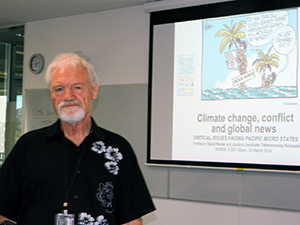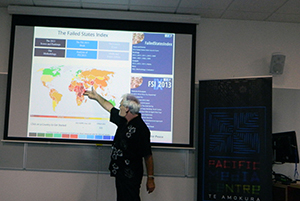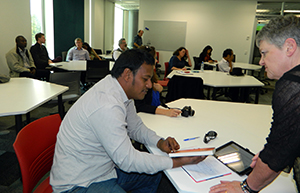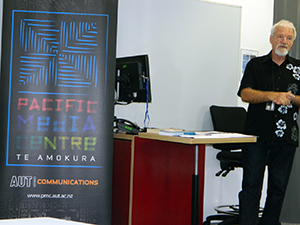
AUCKLAND (Pacific Media Watch): Journalists must support new models of deliberative journalism and the revival of participatory democracy if they are to play a role in helping combat climate change in the Pacific.
Pacific Media Centre director Professor David Robie told a seminar at Auckland University of Technology last night that Pacific nations were already in the grip of climate change, unlike the scenarios depicted in Hollywood blockbuster movies which showed climate change as a phenomenon impacting on cities like New York and London in 50 years time.
A major problem in the Pacific is that much climate change reporting comes from Western news agencies and from news sources based in Australia. He cited Australian research indicating the Rupert Murdoch's News Limited group giving disproportionate space to climate change denialists.
 Dr Robie said climate change should not be just another "journalistic beat" because the planet's survival was at stake.
Dr Robie said climate change should not be just another "journalistic beat" because the planet's survival was at stake.
The seminar on "Climate change, conflict and global news - critical issues facing Pacific micro states" heard that traditional news values of "impartial reporting" and "objectivity" had been "severely tested" by climate change.
Some mainstream media outlets that prized themselves on being "balanced" had taken advantage of the failure of the 2009 Copenhagen to give climate change denialists a larger voice in the media.
But Pacific journalists were in a different position, living in countries already in the grip of climate change, with many people already having been forced to adapt to daily life in communities directly affected.
'Barrage of facts'
Quoting author Robert McChesney, Dr Robie said contemporary professional journalism's frequent failure to provide background and context for complex stories had often meant that climate change reporting became little more than "a barrage of facts and official statements", which could be misleading.
This was not objectivity because the "mere decision to cover this, or not cover this...is a subjective one," Robie said.
For example, Australia was one of the world's biggest polluters and the majority of its citizens accept climate change was a reality, yet many news media treated climate change as "just another journalist round" on a par with health, crime and education reporting, said Dr Robie, citing recent Australian research.
Instead, "the media can actually contribute to society" said Dr Robie.
"Journalism should really take into account a lot more of what the community wants. Journalists these days are far too close to the seats of power" he added.
Deliberative journalism was a good model for reporting climate change because it allowed journalists to include insights, background and offered possible solutions.
Currently, mainstream Western journalists, especially in New Zealand, only covered the Pacific in short bursts when there was a coup or major weather disaster, Dr Robie added.
Not 'disappearing' AUT doctoral candidate Taberannang Korauaba, also the editor of the Kiribati Independent newspaper, spoke at the same seminar and called for Western media to stop referring to Kiribati as a "disappearing" nation.
AUT doctoral candidate Taberannang Korauaba, also the editor of the Kiribati Independent newspaper, spoke at the same seminar and called for Western media to stop referring to Kiribati as a "disappearing" nation.
The Kiribati Independent sources more than 80 per cent of its news from the community and had a dedicated page each week for climate change news.
"When you tell people they are going to disappear and the next day you come back to work with them to adapt, there is a problem," he said.
"As humans, we don't want to hear someone come and tell us that we will die next year. There is something wrong with the campaign from the beginning when they use the word disappearing."
Kiribati residents were also tired of the mainstream media narrative which set out a scenario where a white male would come and rescue the indigenous people of the disappearing nation.
Talking about "disappearing nations" was disempowering and did nothing to help the more useful idea that people must adapt to climate change. In his research, Korauaba found that the governments of Kiribati, Federated States of Micronesia and the Marshall Islands were focussing now on working with their citizens to adapt to climate change and on looking for solutions to the threat of being submerged.
In his research, Korauaba found that the governments of Kiribati, Federated States of Micronesia and the Marshall Islands were focussing now on working with their citizens to adapt to climate change and on looking for solutions to the threat of being submerged.
However, it was "very hard to encourage the media to be part of finding solutions because that is not their role, that (role) belongs to the government - finding solutions", he said.
The media still saw their role only as spreading news, Korauaba added.
This work is licensed under a Creative Commons Attribution-NonCommercial 3.0 New Zealand Licence.




